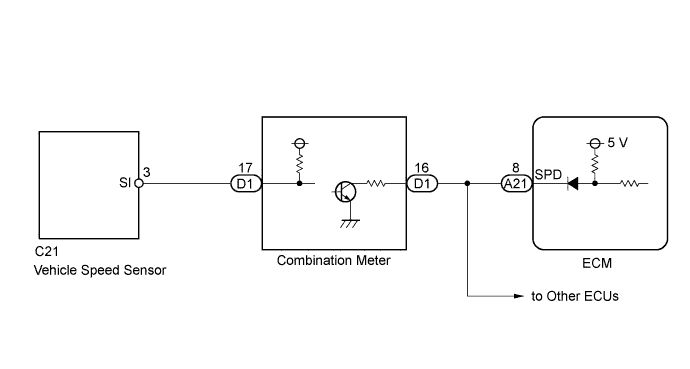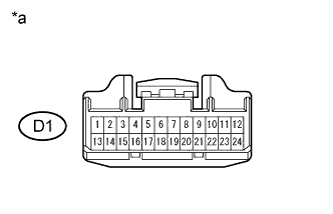Dtc P0500 Vehicle Speed Sensor A
DESCRIPTION
MONITOR DESCRIPTION
MONITOR STRATEGY
TYPICAL ENABLING CONDITIONS
TYPICAL MALFUNCTION THRESHOLDS
CONFIRMATION DRIVING PATTERN
WIRING DIAGRAM
INSPECTION PROCEDURE
CHECK OPERATION OF SPEEDOMETER
READ VALUE USING TECHSTREAM (VEHICLE SPEED)
CHECK HARNESS AND CONNECTOR (COMBINATION METER - ECM)
CHECK COMBINATION METER (VOLTAGE)
INSPECT COMBINATION METER (SPD SIGNAL OUTPUT WAVEFORM)
INSPECT COMBINATION METER (SPD SIGNAL INPUT WAVEFORM)
CHECK HARNESS AND CONNECTOR (COMBINATION METER - VEHICLE SPEED SENSOR)
DTC P0500 Vehicle Speed Sensor "A" |
DESCRIPTION
The vehicle speed is detected using the No. 1 vehicle speed sensor. The No. 1 vehicle speed sensor transmits a 4-pulse signal for every revolution of the rotor shaft, which is rotated by the transaxle output shaft via the driven gear. The 4-pulse signal is converted into a more precise rectangular waveform by the waveform shaping circuit inside the combination meter. The signal is then transmitted to the ECM. The ECM determines the vehicle speed based on the frequency of the pulse signal.DTC No.
| DTC Detection Condition
| Trouble Area
|
P0500
| While vehicle being driven, no vehicle speed sensor signal transmitted to ECM
(1 trip detection logic: Automatic transaxle)
(2 trip detection logic: Manual transaxle)
| - Open or short in speed signal circuit
- Vehicle speed sensor
- Combination meter
- ECM
- Wire harness or connector
|
MONITOR DESCRIPTION
- Automatic Transaxle Models
The ECM assumes that the vehicle is being driven when the indicated engine speed is more than 2080 rpm and 30 seconds have elapsed since the Park/Neutral Position (PNP) switch was turned OFF (typical example values). If there is no speed signal from the combination meter, despite these conditions being met, the ECM interprets this as a malfunction in the speed signal circuit. The ECM then illuminates the MIL and stores the DTC.
- Manual Transaxle Models
The ECM assumes that the vehicle is being driven when fuel cut with the accelerator pedal released continues for 5 seconds or more. If there is no speed signal from the combination meter, despite this condition being met, the ECM interprets this as a malfunction in the speed signal circuit. The ECM then illuminates the MIL and stores the DTC.
MONITOR STRATEGY
Related DTCs
| P0500: Vehicle speed sensor "A" pulse input error
|
Required Sensors/Components (Main)
| Vehicle Speed Sensor (VSS), Combination meter and Skid control ECU
|
Required Sensors/Components (Related)
| Park/Neutral Position (PNP) switch, Engine Coolant Temperature (ECT) sensor, Crankshaft Position (CKP) sensor, Throttle Position (TP) sensor and Mass Air Flow (MAF) meter
|
Frequency of Operation
| Continuous
|
Duration
| 2 seconds: Automatic transaxle, Intake air temperature -10°C (14°F) or more
8 seconds: Automatic transaxle, Intake air temperature less than -10°C (14°F)
4.25 seconds: Manual transaxle
|
MIL Operation
| Immediate: Automatic transaxle
2 driving cycles: Manual transaxle
|
Sequence of Operation
| None
|
TYPICAL ENABLING CONDITIONS
M/T:Monitor runs whenever following DTCs not present
| None
|
Time after ignition switch turned from OFF to ON
| 3 seconds or more
|
Battery voltage
| 8 V or higher
|
Ignition switch
| ON
|
Starter
| OFF
|
Fuel-cut
| ON
|
A/T:Monitor runs whenever following DTCs not present
| None
|
Ignition Switch
| ON
|
Time after Ignition switch OFF to ON
| 3 seconds or more
|
Battery voltage
| 8 V or higher
|
Starter
| OFF
|
Either of following conditions (a) or (b) met:
| -
|
(a) Following conditions 1 and 2 met:
| -
|
1. ECT and ECT sensor
| 20°C (68°F) or more, and sensor does not malfunction (P0115 or P00117, P0118, P0125)
|
2. Time after PNP switch turned OFF
| 10 seconds or more
|
(b) Following conditions 1 and 2 met:
| -
|
1. ECT and ECT sensor
| Less than 20°C (68°F), and sensor malfunction (P0115 or P0117, P0118, P0125)
|
2. Time after PNP switch turned OFF
| 30 seconds or more
|
TP sensor fail (P0120, P0121, P0122, P0123, P0220, P0222, P0223, P2135)
| Not detected
|
Engine speed
| 2080 rpm or more (varies with throttle valve opening angle)
|
Fuel cut at high engine speed
| Not executing
|
Time after Ignition switch OFF to ON
| More than 0.5 seconds
|
TP sensor learning
| Completed
|
TYPICAL MALFUNCTION THRESHOLDS
Vehicle speed sensor signal
| No pulse input
|
CONFIRMATION DRIVING PATTERN

- Connect the Techstream to the DLC3.
- Turn the ignition switch to ON and turn the Techstream on.
- Clear DTCs (even if no DTCs are stored, perform the clear DTC operation).
- Turn the ignition switch off and wait for at least 30 seconds.
- Turn the ignition switch to ON and turn the Techstream on [A].
- Start the engine and warm it up until the ECT reaches 75°C (167°F) or higher [B].
- Accelerate the vehicle to 74 km/h (46 mph) or higher [C].
- Maintain the vehicle speed at 74 km/h (46 mph) or higher for 10 seconds or more [D].
- Decelerate the vehicle by releasing the accelerator pedal for 5 seconds or more to perform fuel cut [E].
- CAUTION:
- When performing the confirmation driving pattern, obey all speed limits and traffic laws
- Enter the following menus: Powertrain / Engine and ECT / Trouble Codes [F].
- Read pending DTCs.
- HINT:
- If a pending DTC is output, the system is malfunctioning.
- If a pending DTC is not output, perform the following procedure.
- Enter the following menus: Powertrain / Engine and ECT / Utility / All Readiness.
- Input the DTC: P0500.
- Check the DTC judgment result.
Techstream Display
| Description
|
NORMAL
| - DTC judgment completed
- System normal
|
ABNORMAL
| - DTC judgment completed
- System abnormal
|
INCOMPLETE
| - DTC judgment not completed
- Perform driving pattern after confirming DTC enabling conditions
|
N/A
| - Unable to perform DTC judgment
- Number of DTCs which do not fulfill DTC preconditions has reached ECU memory limit
|
- HINT:
- If the judgment result shows NORMAL, the system is normal.
- If the judgment result shows ABNORMAL, the system has a malfunction.
- If the result is INCOMPLETE or N/A and no pending DTC is output, perform a universal trip and check for permanent DTCs (YARIS_NCP93 RM000000PDK0QGX.html).
- HINT:
- If a permanent DTC is output, the system is malfunctioning.
- If no permanent DTC is output, the system is normal.
WIRING DIAGRAM
INSPECTION PROCEDURE
- HINT:
- Various systems use the vehicle speed signal distributed from the combination meter. Check all the components possibly related to speed signal.
- Read freeze frame data using the Techstream. The ECM records vehicle and driving condition information as freeze frame data the moment a DTC is stored. When troubleshooting, freeze frame data can help determine if the vehicle was moving or stationary, if the engine was warmed up or not, if the air fuel ratio was lean or rich, and other data from the time the malfunction occurred.
| 1.CHECK OPERATION OF SPEEDOMETER |
Drive the vehicle and check whether the operation of the speedometer in the combination meter is normal.
- OK:
- The operation of the speedometer is normal.
- HINT:
- The vehicle speed sensor is operating normally if the speedometer reading is normal.
- If the speedometer does not operate, check it by following the procedure described in Speedometer Malfunction (YARIS_NCP93 RM000001DAL00MX.html).
| | GO TO MALFUNCTION IN SPEEDOMETER |
|
|
| 2.READ VALUE USING TECHSTREAM (VEHICLE SPEED) |
Connect the Techstream to the DLC3.
Turn the ignition switch to ON.
Turn the Techstream on.
Enter the following menus: Powertrain / Engine and ECT / Data List / Vehicle Speed.
Drive the vehicle.
Read the value displayed on the Techstream.
- OK:
- Vehicle speeds displayed on the Techstream and speedometer display are equal.
| 3.CHECK HARNESS AND CONNECTOR (COMBINATION METER - ECM) |
Disconnect the combination meter connector.
Disconnect the ECM connector.
Measure the resistance according to the value(s) in the table below.
- Standard Resistance (Check for Open):
Tester Connection
| Condition
| Specified Condition
|
D1-16 - A21-8 (SPD)
| Always
| Below 1 Ω
|
- Standard Resistance (Check for Short):
Tester Connection
| Condition
| Specified Condition
|
D1-16 or A21-8 (SPD) - Body ground
| Always
| 10 kΩ or higher
|
- HINT:
- If the wire has a short, check the speed signal circuit in other systems related to the vehicle speed signal (e.g. tire pressure warning system, audio system, etc.).
Reconnect the combination meter connector.
Reconnect the ECM connector.
| | REPAIR OR REPLACE HARNESS OR CONNECTOR (OTHER SYSTEMS RELATED TO SPEED SIGNAL) |
|
|
| 4.CHECK COMBINATION METER (VOLTAGE) |
Disconnect the combination meter connector.
- HINT:
- Disconnect the ECU connectors on the other systems related to the speed signal (but the ECM connectors must be connected).
Turn the ignition switch to ON.
Measure the voltage according to the value(s) in the table below.
- Standard Voltage:
Tester Connection
| Switch Condition
| Specified Condition
|
D1-16 - Body ground
| Ignition switch ON
| 4.5 to 5.5 V
|
Text in Illustration*a
| Front view of wire harness connector
(to Combination Meter)
|
Reconnect the combination meter connector.
| 5.INSPECT COMBINATION METER (SPD SIGNAL OUTPUT WAVEFORM) |
Remove the combination meter assembly (YARIS_NCP93 RM000000IN001JX.html).
Connect the combination meter connector.
Move the shift lever to the neutral position.
Jack up the vehicle.
Turn the ignition switch to ON.
Check the voltage between the terminal of the combination meter and the body ground while the wheel is turned slowly.
- Standard Voltage:
Tester Connection
| Switch Condition
| Specified Condition
|
D1-16 - Body ground
| Ignition switch ON
(Turn wheel slowly)
| Voltage generated intermittently
|
Text in Illustration *a
| Component with wire harness connected
(Combination Meter)
|
*b
| Turn Wheel
|
- HINT:
- The output voltage should fluctuate up and down, similarly to the diagram, when the wheel is turned slowly.
Reinstall the combination meter assembly (YARIS_NCP93 RM000000IMY01KX.html).
| 6.INSPECT COMBINATION METER (SPD SIGNAL INPUT WAVEFORM) |
Remove the combination meter assembly (YARIS_NCP93 RM000000IN001JX.html).
Connect the combination meter connector.
Move the shift lever to the neutral position.
Jack up the vehicle.
Turn the ignition switch to ON.
Check the voltage between the terminal of the combination meter and the body ground while the wheel is turned slowly.
- Standard Voltage:
Tester Connection
| Switch Condition
| Specified Condition
|
D1-17 - Body ground
| Ignition switch ON
(Turn wheel slowly)
| Voltage generated intermittently
|
Text in Illustration *a
| Component with wire harness connected
(Combination Meter)
|
*b
| Turn Wheel
|
- HINT:
- The output voltage should fluctuate up and down, similarly to the diagram, when the wheel is turned slowly.
Reinstall the combination meter assembly (YARIS_NCP93 RM000000IMY01KX.html).
ResultResult
| Proceed to
|
OK
| A
|
NG
| B
|
| 7.CHECK HARNESS AND CONNECTOR (COMBINATION METER - VEHICLE SPEED SENSOR) |
Disconnect the combination meter connector.
Disconnect the vehicle speed sensor connector.
Measure the resistance according to the value(s) in the table below.
- Standard Resistance (Check for Open):
Tester Connection
| Condition
| Specified Condition
|
D1-17 - C21-3 (SI)
| Always
| Below 1 Ω
|
- Standard Resistance (Check for Short):
Tester Connection
| Condition
| Specified Condition
|
D1-17 or C21-3 (SI) - Body ground
| Always
| 10 kΩ or higher
|
Reconnect the combination meter connector.
Reconnect the vehicle speed sensor connector.
| | REPAIR OR REPLACE HARNESS OR CONNECTOR |
|
|
| OK |
|
|
|
| REPLACE VEHICLE SPEED SENSOR |
|





